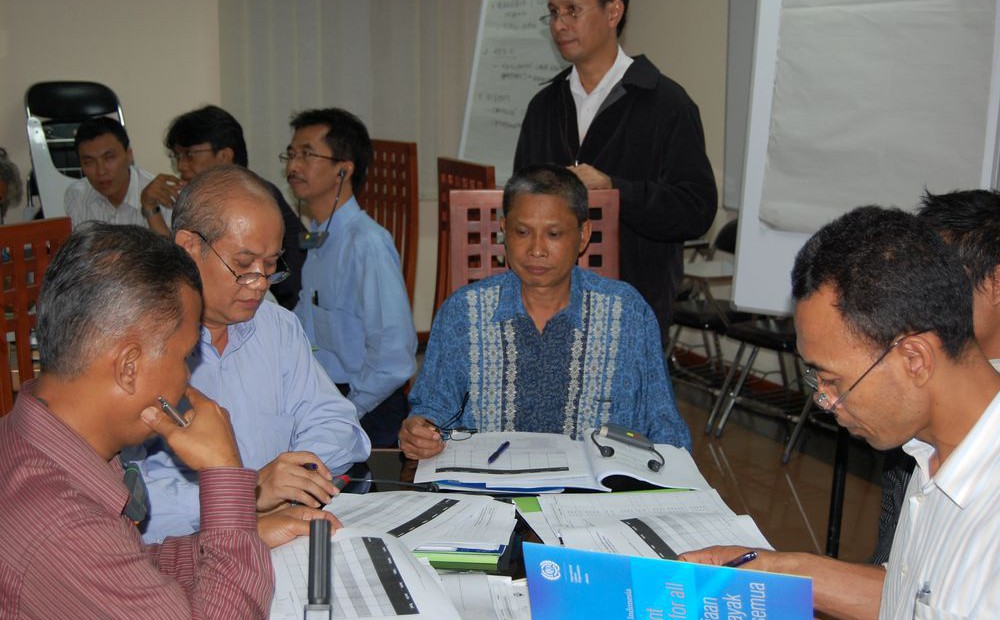As promised in our post dated 14 October we bring to you an interview with Michael Elkin, the Chief Technical Adviser (CTA) for the Sustaining Competitive and Responsible Enterprises (SCORE) project of the ILO, which was launched in India in 2011. The ICRC encourages its potential suppliers of essential household items to be distributed among people in conflicts across the world to undertake SCORE if they fail to meet all the assessment parameters of being socially and ethically responsible enterprises.
Q: Can you please elaborate on ILO’s SCORE project? What does SCORE entail and what is its scope?
A: SCORE is a practical training and in-factory counselling programme that improves productivity and working conditions in small and medium enterprises (SMEs). SCORE Training demonstrates best international practices in the manufacturing and service sectors and helps SMEs participate in global supply chains.
Q: What is the training methodology and the main topics covered in SCORE?
A: SCORE Training focuses on developing cooperative working relations resulting in shared benefits. The five SCORE Training modules cover workplace cooperation; quality management; clean production; human resource management; occupational safety and health. Each module includes a two-day classroom training for managers and workers, followed by on-site consultations with industry experts who help translate the training into action.
Q: Could you give us some background on SCORE? When and where was it launched? Why did the ILO feel the need for introducing such a project?
A: SCORE was launched in 2009 in Geneva, and it was implemented in South Africa, China and Indonesia in 2010. The ILO is looking for opportunities to demonstrate the business case for good working conditions. There is considerable evidence that responsible workplace practices — occupational safety and health (OSH) compliance, fair wages, social dialogue and good environmental performance — are strongly correlated to higher levels of productivity and firm competitiveness.
Q: Which countries has SCORE been implemented in? Why these countries and not others? Does ILO plan to expand geographically?
A: SCORE is currently operating in India, Vietnam, China, Indonesia, Peru, Bolivia, Colombia, Ghana and South Africa. The ILO chooses countries that have competitive industries with good job creation potential and can benefit from SCORE methodologies. Discussions are on to bring SCORE to Turkey, Kenya, Myanmar and the Croatia.
Q: How the project was received when it was launched? Was there resistance or did it find acceptability immediately? What is the mindset of companies towards SCORE now?
A: SCORE was received well right from the beginning. Private companies are looking for practical, non capital-intensive methods to boost productivity. Companies that participate fully in SCORE Training become enthused about implementing what they have learnt once they realize the promised benefits. However, SCORE requires a commitment to improve and a change in enterprise culture to be successful. Not all companies are ready for this.
Q: How does SCORE benefit participating companies? Does it help them in getting greater global acceptability and increasing their social compliance?
A: Companies first benefit from better communication at the workplace, which improves employee engagement. As the process continues, companies see improvements in indicators like defect rates, productivity, absenteeism and labour turnover. OSH issues are more complex, but we believe OSH compliance too improves and we see cases in each country to support this.
We believe that SCORE also has an impact on the social compliance indicators of companies in supply chains. We have done some pilots with suppliers of global brands and the preliminary results confirm this belief.
Q: The ICRC encourages companies that it purchases from to undergo the SCORE training. How do you see the ICRC’s role in promoting the project?
A: I think the ICRC is helping us raise awareness that factories can take action to improve working conditions and this does not have to be a burden on them, but can be a step towards boosting productivity and competitiveness. The challenge for a country like India is that there are so many SMEs that need to hear our message. The ICRC helps us spread the word and reinforces our key message to SME owners in India.
Q: What is the future of the project? Is the ILO looking at implementing it in any more countries? Are there plans to broaden the base of the course or to offer any more services?
A: The SCORE project will continue as a donor-funded effort until the end of 2017. In each SCORE country, we are working with national governments to embed the training into their private sector development policy agenda and to allocate resources to support SCORE after 2017. ILO is also considering making SCORE a flagship ILO programme, which would have ILO invest more resources to expand the programme on an institutional basis.
SCORE is not currently looking to expand the offering base. Instead, we would prefer to create linkages with other ILO and non-ILO programmes to provide additional services to participating SMEs.
Learn more about SCORE.
ICRC New Delhi
Posts published on the blog reflect the views of the author alone and do not imply the expression of any opinion on the part of the ICRC.



